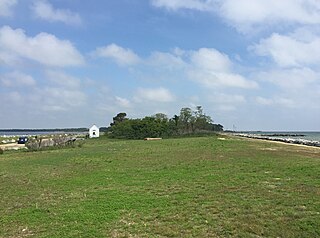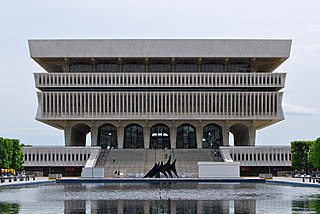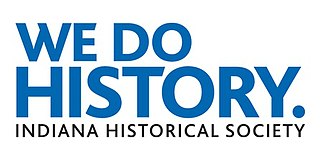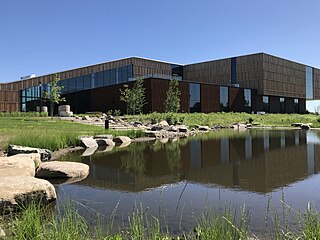
The National Museum of American History: Kenneth E. Behring Center is a historical museum in Washington, D.C. It collects, preserves, and displays the heritage of the United States in the areas of social, political, cultural, scientific, and military history. Among the items on display is the original Star-Spangled Banner. The museum is part of the Smithsonian Institution and located on the National Mall at 14th Street and Constitution Avenue NW in Washington, D.C.

Point Lookout State Park is a public recreation area and historic preserve occupying Point Lookout, the southernmost tip of a peninsula formed by the confluence of Chesapeake Bay and the Potomac River in St. Mary's County, Maryland. The state park preserves the site of an American Civil War prisoner of war camp and the Point Lookout Light, which was built in 1830. It is the southernmost spot on Maryland's western shore, the coastal region on the western side of the Chesapeake Bay.

The California African American Museum (CAAM) is a museum located in Exposition Park, Los Angeles, California, United States. The museum focuses on enrichment and education on the cultural heritage and history of African Americans with a focus on California and western United States. Admission is free to all visitors. Their mission statement is "to research, collect, preserve, and interpret for public enrichment the history, art and culture of African Americans with an emphasis on California and the western United States."

Fort Harrison, sometimes called Fort Ben, is an Indiana state park located in Lawrence, Indiana, United States, and occupies part of the former site of Fort Benjamin Harrison. The park features a former Citizen's Military Training Camp, Civilian Conservation Corps camp, and World War II prisoner of war camp. There are also picnicking and walking/jogging trails including a connection to the Fall Creek Greenway. The park receives nearly 900,000 visitors annually.

The Minnesota Department of Natural Resources, or Minnesota DNR, is the agency of the U.S. state of Minnesota charged with conserving and managing the state's natural resources. The agency maintains areas such as state parks, state forests, recreational trails, and recreation areas as well as managing minerals, wildlife, and forestry throughout the state. The agency is divided into six divisions - Ecological & Water Resources, Enforcement, Fish & Wildlife, Forestry, Lands & Minerals, and Parks & Trails.

The Illinois State Museum features the life, land, people and art of the State of Illinois. In addition to natural history exhibits, the main museum in Springfield focuses on the state's cultural and artistic heritage. Exhibits include local fossils and mining, household displays from different historic periods, dioramas of Native American life, archaeological and ethnographic artifacts, and a collection of glass paperweights.

The New York State Museum is a research-backed institution in Albany, New York, United States. It is located on Madison Avenue, attached to the south side of the Empire State Plaza, facing onto the plaza and towards the New York State Capitol. The museum houses art, artifacts, and ecofacts that reflect New York’s cultural, natural, and geological development. Operated by the New York State Education Department's Office of Cultural Education, it is the oldest and largest state museum in the US. Formerly located in the State Education Building, the museum now occupies the first four floors of the Cultural Education Center, a ten-story, 1,500,000-square-foot (140,000 m2) building that also houses the New York State Archives and New York State Library.

The North Carolina Museum of Natural Sciences (NCMNS) is a natural history museum in Raleigh, North Carolina. The museum is the oldest in the state, and the largest natural history museum in the Southeastern United States.

The Library of Michigan is the state library of the U.S. state of Michigan, located in the state capital, Lansing. It is housed in the 5-story Michigan Library and Historical Center building. The library's purpose is to collect and preserve Michigan publications, conduct reference and research, and support libraries statewide.

The Indiana Historical Society (IHS) is one of the United States' oldest and largest historical societies. It describes itself as "Indiana's Storyteller".

The Bell Museum, formerly known as the James Ford Bell Museum of Natural History, is located at the University of Minnesota's Saint Paul campus. The museum's current location on the Saint Paul campus opened in 2018. The Minnesota wildlife dioramas focus on animal specimens native to the state. The museum also houses the digital Whitney and Elizabeth MacMillan Planetarium. The museum is part of the university's College of Food, Agricultural and Natural Resource Sciences. The museum's former location on University of Minnesota's Minneapolis campus closed in January 2017.

First State Heritage Park is Delaware's first urban "park without boundaries" linking historic and cultural sites in Dover, Kent County, Delaware, the city that has been the seat of state government since 1777. It is a partnership of state and city agencies under the leadership of Delaware State Parks. Delaware was the first state to ratify the United States Constitution. The sites of the park highlight Delaware's role as the First State. First State Heritage Park is open year-round, with special tours of the sites given the first Saturday of each month.
The Maryland Department of Natural Resources (DNR) is a government agency in the state of Maryland charged with maintaining natural resources including state parks, public lands, state forests, state waterways, wildlife, and recreation areas. Its headquarters are in Annapolis.

The Gateway State Trail is a multi-use recreational rail trail in the U.S. state of Minnesota, running 18 miles (29 km) from Saint Paul to Pine Point Regional Park in Stillwater. It runs through urban landscapes of eastern Saint Paul in Ramsey County and rural farmland and forests in Washington County. It was designated a National Recreation Trail in 2002.

The New Jersey State Museum is located at 195-205 West State Street in Trenton, in the U.S. state of New Jersey. The museum's collections include natural history specimens, archaeological and ethnographic artifacts, and cultural history and fine art objects. Exhibitions, educational activities, research programs, and lectures are also offered. The museum, a division of the New Jersey Department of State, includes a 140-seat planetarium and a 384-seat auditorium.

The Missouri Department of Natural Resources (MoDNR) of the government of the U.S. state of Missouri consists of the Division of Environmental Quality, the Division of Geology and Land Survey, the Division of State Parks, the Environmental and Energy Resources Authority, and the Field Services Division. The Director of MoDNR is Dru Buntin (2021–present).

The Brigham City Museum of Art & History, also known as the BCMG or, formerly, the Brigham City Museum-Gallery, is an art museum and history museum in Brigham City, Utah. The museum is a department of Brigham City Corporation, but also has a non-profit foundation, the Box Elder Museum Foundation, Inc.
The South Dakota Cultural Heritage Center in Pierre, South Dakota, is the headquarters of the South Dakota State Historical Society. Opened in 1989, the center houses the State Historical Society’s administrative, historic preservation, and research and publishing offices. The Center is also the home of the State Archives and Museum which manages the South Dakota Digital Archives. Through these five programs, the South Dakota State Historical Society preserves and interprets the history and culture of South Dakota and its people.
Boone County Historical Society was established in 1924. Located in Columbia, Missouri, United States, the Boone County Historical Museum has been collecting, preserving and exhibiting artifacts and records of the people of Boone County, Missouri.
















